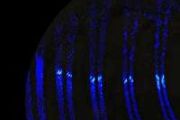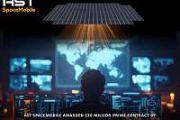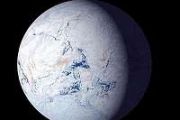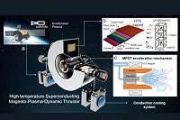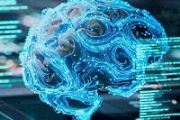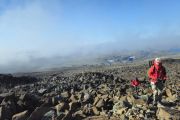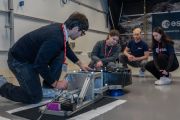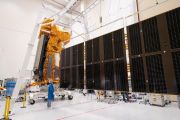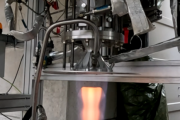
Copernical Team
ESO telescope images planet around most massive star pair to date
 The European Southern Observatory's Very Large Telescope (ESO's VLT) has captured an image of a planet orbiting b Centauri, a two-star system that can be seen with the naked eye. This is the hottest and most massive planet-hosting star system found to date, and the planet was spotted orbiting it at 100 times the distance Jupiter orbits the Sun. Some astronomers believed planets could not exist a
The European Southern Observatory's Very Large Telescope (ESO's VLT) has captured an image of a planet orbiting b Centauri, a two-star system that can be seen with the naked eye. This is the hottest and most massive planet-hosting star system found to date, and the planet was spotted orbiting it at 100 times the distance Jupiter orbits the Sun. Some astronomers believed planets could not exist a NASA's IXPE X-ray telescope will study neutron stars, pulsars, black holes
 NASA intends to learn more about stars, neutron stars, black holes, nebulae and other space objects by launching a new X-ray telescope satellite, the IXPE, from Florida early Thursday.
The $214 million IXPE satellite, or X-ray Polarimetry Explorer, will orbit the Earth as the first satellite dedicated to measuring the polarization of X-rays from a variety of cosmic sources, according to NA
NASA intends to learn more about stars, neutron stars, black holes, nebulae and other space objects by launching a new X-ray telescope satellite, the IXPE, from Florida early Thursday.
The $214 million IXPE satellite, or X-ray Polarimetry Explorer, will orbit the Earth as the first satellite dedicated to measuring the polarization of X-rays from a variety of cosmic sources, according to NA Planet decision that booted out Pluto is rooted in folklore, astrology
 As the new space race continues, a team of top researchers says one thing needs to be cleared up - what exactly is a planet?
In a study appearing recently in the journal Icarus, the researchers hope to set the record straight with a look at how a planet's definition has changed since the time of Galileo to the controversial decision the International Astronomical Union made in 2006 to crea
As the new space race continues, a team of top researchers says one thing needs to be cleared up - what exactly is a planet?
In a study appearing recently in the journal Icarus, the researchers hope to set the record straight with a look at how a planet's definition has changed since the time of Galileo to the controversial decision the International Astronomical Union made in 2006 to crea Russia strikes deal with NASA for first cosmonaut on SpaceX flight
 Russia's only active female cosmonaut, Anna Kikina, will make her first trip into space in fall 2022 as the first Russian to fly on a SpaceX Crew Dragon capsule, Russia's space agency announced Wednesday on Twitter.
Dmitry Rogozin, director general of Russia's Roscosmos agency, said his program has pledged a seat of a Russian Soyuz capsule to an American astronaut in return.
Rogozin
Russia's only active female cosmonaut, Anna Kikina, will make her first trip into space in fall 2022 as the first Russian to fly on a SpaceX Crew Dragon capsule, Russia's space agency announced Wednesday on Twitter.
Dmitry Rogozin, director general of Russia's Roscosmos agency, said his program has pledged a seat of a Russian Soyuz capsule to an American astronaut in return.
Rogozin Russia's cosmos town, an isolated relic of Soviet glory
 Malik Mutaliyev walks by an abandoned amusement park in wintry Baikonur, a secretive town in Kazakhstan's inhospitable steppe that appeared alongside the eponymous Baikonur Cosmodrome where the Soviet Union's space programme rose to glory.
"Our town has lived through a lot: Perestroika, the fall of the Soviet Union, electricity shortages. We've been through it all," says the 67-year-old form
Malik Mutaliyev walks by an abandoned amusement park in wintry Baikonur, a secretive town in Kazakhstan's inhospitable steppe that appeared alongside the eponymous Baikonur Cosmodrome where the Soviet Union's space programme rose to glory.
"Our town has lived through a lot: Perestroika, the fall of the Soviet Union, electricity shortages. We've been through it all," says the 67-year-old form Blue Origin flight with Alan Shephard daughter delayed by weather
 A Blue Origin flight due to include the daughter of the first American to travel to space has been delayed by two days because of forecasts of bad weather, the company said Wednesday.
The flight was originally scheduled for Thursday but because of winds forecast for both that day and Friday it will now aim to lift off on Saturday at 8:45 am (1445 GMT) from West Texas.
Laura Shepard Churc
A Blue Origin flight due to include the daughter of the first American to travel to space has been delayed by two days because of forecasts of bad weather, the company said Wednesday.
The flight was originally scheduled for Thursday but because of winds forecast for both that day and Friday it will now aim to lift off on Saturday at 8:45 am (1445 GMT) from West Texas.
Laura Shepard Churc Soyuz docks at ISS with three onboard
 A Russian rocket carrying a Japanese billionaire docked with the International Space Station on Wednesday, marking the country's return to space tourism after a decade-long pause that saw the rise of competition from the United States.
Online fashion tycoon Yusaku Maezawa and his assistant Yozo Hirano blasted off from the Baikonur cosmodrome in Kazakhstan earlier on Wednesday.
They dock
A Russian rocket carrying a Japanese billionaire docked with the International Space Station on Wednesday, marking the country's return to space tourism after a decade-long pause that saw the rise of competition from the United States.
Online fashion tycoon Yusaku Maezawa and his assistant Yozo Hirano blasted off from the Baikonur cosmodrome in Kazakhstan earlier on Wednesday.
They dock Mars helicopter flies again; encounters radio interference on 17th flight
 Ingenuity flew for the 17th time at Mars on Sunday, Dec. 5. After the helicopter executed the planned 614-foot (187-meter) traverse to the northeast, the radio communications link between Ingenuity and the Perseverance Mars rover was disrupted during the final descent phase of the flight. Approximately 15 minutes later, Perseverance received several packets of additional Ingenuity telemetry indicating that the flight electronics and battery were healthy.
Ingenuity flew for the 17th time at Mars on Sunday, Dec. 5. After the helicopter executed the planned 614-foot (187-meter) traverse to the northeast, the radio communications link between Ingenuity and the Perseverance Mars rover was disrupted during the final descent phase of the flight. Approximately 15 minutes later, Perseverance received several packets of additional Ingenuity telemetry indicating that the flight electronics and battery were healthy. Japanese billionaire arrives at ISS
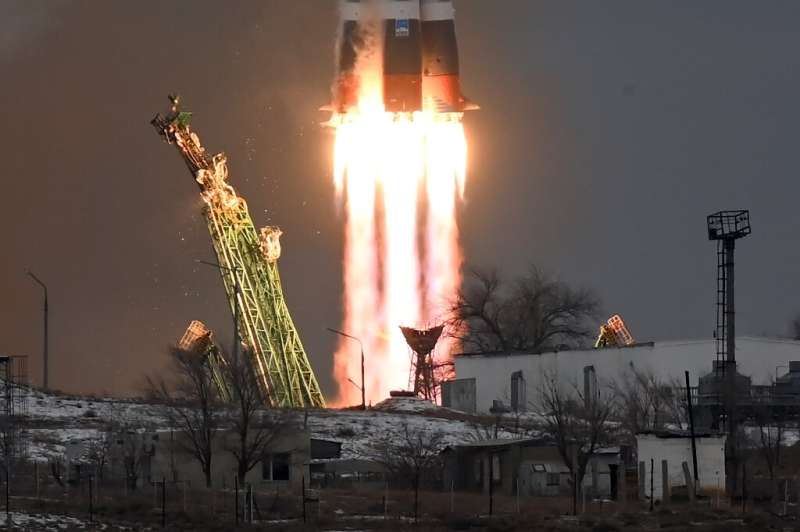
A Russian rocket lifted off on Wednesday carrying a Japanese billionaire to the International Space Station, marking the country's return to space tourism after a decade-long pause that saw the rise of competition from US companies.
Online fashion tycoon Yusaku Maezawa and his production assistant Yozo Hirano blasted off from the Russian-operated Baikonur cosmodrome in Kazakhstan at 0738 GMT, an AFP correspondent at the scene reported.
Their journey aboard the three-person Soyuz spacecraft piloted by cosmonaut Alexander Misurkin will take just over six hours, capping a banner year that many have seen as a turning point for private space travel.
Billionaires, Elon Musk, Jeff Bezos and Richard Branson all made breakthrough commercial tourism flights this year, bursting into a market Russia is keen to defend.
Singapore's first 3D-printed artefact to be launched to the moon
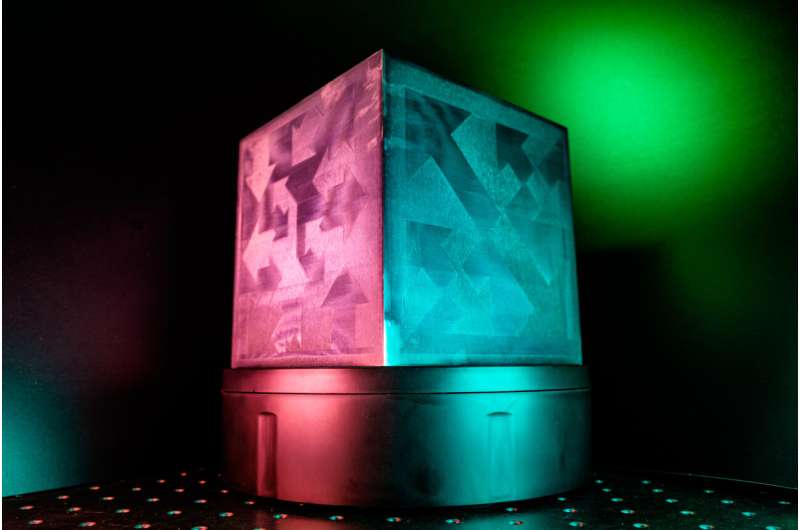
The Moon Gallery Foundation is developing an art gallery to be sent to the Moon, contributing to the establishment of the first lunar outpost and permanent museum on Earth's only natural satellite. The international initiative will see one hundred artworks from artists around the world integrated into a 10 cm x 10 cm x 1 cm grid tray, which will fly to the Moon by 2025. The Moon Gallery aims to expand humanity's cultural dialog beyond Earth. The gallery will meet the cosmos for the first time in low Earth orbit in 2022 in a test flight.
The test flight is in collaboration with Nanoracks, a private in-space service provider.




















